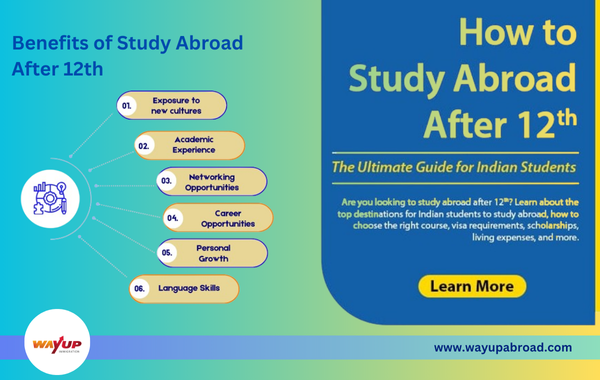Table of Content
Study Abroad After 12th - Overview
Interestingly, there has been a notable increase in the number of Indian students choosing to study overseas over the years. A new analysis from reliable sources (derived from Business Standard) projects that by 2025, there will be an astounding 1.8 million Indian students studying overseas.
Did you know that a growing number of kids are choosing to study abroad after completing their 12th grade education?
This tendency has a number of causes. A lot of students desire to travel and see different cultures in order to stand out in the employment market. Studying overseas also offers chances for cutting-edge research and creativity.
Studying abroad after 12th grade unlocks a treasure chest of benefits for your academic and personal development. You'll gain access to unique programs and innovative teaching methods that can propel you forward in your chosen field. A globally recognized degree from a prestigious university becomes your calling card, opening doors to exciting job opportunities worldwide.
This blog is for you if you are thinking about studying abroad after your senior year of high school but are unclear about what to do. We've included all the pertinent information you need to make an informed decision about funding a foreign education and start your exciting career adventure.
Let's examine why studying overseas following the 12th is the ideal way to get started.
Benefits of Studying Abroad After 12th
Beyond academics, studying abroad throws you headfirst into a whirlwind of cultural immersion. Living in a new country broadens your perspective, fosters independence, and lets you experience a different way of life. Daily exposure to a new language supercharges your fluency and communication skills. The friendships and connections you build with people from all corners of the globe become lifelong treasures.
Scholarships can help ease the financial burden, and the international experience combined with your degree makes you a highly sought-after candidate for employers seeking well-rounded individuals. It's an adventure filled with challenges, but with careful planning and research, studying abroad after 12th grade can be a transformative experience that shapes your future.
Diverse programs and innovative teaching methods: Gain access to unique academic opportunities and experience fresh approaches to learning.
Globally recognized degree: A prestigious international degree opens doors to exciting job prospects worldwide.
Cultural immersion: Experience a new way of life, broaden your perspective, and foster independence.
Language fluency boost: Daily exposure to a new language significantly improves your communication skills.
Lifelong friendships and global network: Build connections with people from all over the world.
Scholarship opportunities: Financial aid options can help make studying abroad more accessible.
Enhanced career prospects: Become a highly attractive candidate for employers seeking well-rounded individuals with international experience.
General Admission Requirements for UG Study Abroad
General admission requirements for undergraduate study abroad can vary depending on the specific country, university, and program you're applying to. However, there are some general requirements that are common across most institutions. Here's a breakdown of the most common ones:
Academic transcripts: You'll need to submit official transcripts from your high school, and possibly any colleges you've previously attended. These transcripts will show your academic record, including your grades and coursework.
Standardized test scores: Many universities abroad require you to take a standardized test, such as the SAT or ACT (for US universities), or the IELTS or TOEFL (for English language proficiency). The specific test requirement will vary depending on the university and program.
English language proficiency: If English is not your native language, you'll likely need to take an English language proficiency test, such as the TOEFL or IELTS. The required score will vary depending on the university.
Letters of recommendation: Most universities will require you to submit one or two letters of recommendation from teachers, counselors, or other professionals who can speak to your academic abilities and potential.
Personal statement or essay: The personal statement or essay is your chance to tell the university about yourself, your academic goals, and why you're interested in studying abroad. This is a crucial aspect of your application, so be sure to write a strong and compelling essay.
Application fee: There is usually an application fee associated with applying to universities abroad. The fee will vary depending on the university.
Financial documentation: You may need to submit documentation to show that you have the financial resources to cover the cost of tuition and living expenses while you're studying abroad.
Passport and visa: You will need a valid passport to travel and study abroad. You may also need to apply for a student visa from the embassy or consulate of the country you'll be studying in.
Exams Required for Foreign Education After 12th
The exams required for foreign education after 12th can vary depending on the specific country, university, and program you're applying to. However, there are two main types of exams that are commonly required:
Standardized tests: These tests are designed to assess your academic abilities and potential for success in college. The specific test you'll need to take will vary depending on the university and program, but some of the most common standardized tests include:
SAT (Scholastic Assessment Test): This test is required for admission to most undergraduate programs in the United States.
ACT (American College Testing): This test is another option for admission to undergraduate programs in the United States. It is similar to the SAT in content and format.
English language proficiency tests: If English is not your native language, you'll likely need to take an English language proficiency test to demonstrate your ability to understand and communicate in English. The most common English language proficiency tests are:
- TOEFL (Test of English as a Foreign Language): This test is widely accepted by universities around the world.
- IELTS (International English Language Testing System): This test is another popular option, and it is particularly common in the United Kingdom, Australia, and New Zealand.
Procedure to Study Abroad After 12th
Explore & Plan Early:
Identify your academic interests and target relevant universities/programs.
Shortlist countries considering factors like lifestyle, program offerings, and costs.
Academic Requirements:
Meet the minimum academic marks set by your target universities.
Gather official transcripts from your 12th grade.
Research and take required standardized tests (SAT/ACT, IELTS/TOEFL, etc.).
Application Documents:
Craft a compelling personal statement showcasing your goals and motivations.
Request strong recommendation letters from teachers or counselors.
Prepare any additional documents required by universities (CV/resume, financials, passport).
University Applications:
Strictly meet application deadlines set by each university.
Pay any application fees associated with the universities you apply to.
Offers & Decisions:
Carefully evaluate offer letters considering program details, scholarships, and financial aid.
Accept an offer and confirm your place at your chosen university.
Visa Application:
Research and apply for the appropriate student visa for your chosen country.
Pre-departure Preparations:
Secure student housing or finalize living arrangements near your university.
Plan your budget for tuition, living expenses, and travel (explore scholarships/financial support).
Book flights, arrange airport transfers (if needed), and familiarize yourself with arrival procedures.
Cost of Studying UG Abroad
After the 12th grade, studying overseas can be costly, but the expenditure may be justified. Studying UG overseas might be expensive depending on the nation, university, and course.
Popular courses in the social sciences and liberal arts can be less expensive than those in the business, engineering, and medical fields. The most sought-after locations for undergraduate studies are the US, UK, Canada, and Australia. Tuition for these countries ranges from $20,000 (INR 17L) to $50,000 (INR 46L) annually.
Nonetheless, there are a number of financial assistance programs and scholarships available to lessen the cost of attendance.
Scholarship Opportunities to Study Abroad After 12th
Scholarship opportunities to study abroad after 12th grade are plentiful, coming from various sources:
- Government Scholarships: Many governments offer scholarships to international students, including programs like:
- Fulbright-Nehru Fellowships (USA-India)
- Commonwealth Scholarships (UK)
- Chevening Scholarships (UK)
- SN Bose Scholarship (USA-India) (These are just a few examples, research specific programs for your target country)
- University-Specific Scholarships: Many universities abroad have their own scholarship programs specifically for international students. These scholarships can cover tuition fees, living expenses, or a combination of both. Research the financial aid section of the universities you're interested in.
- Externally Funded Scholarships: There are a number of private foundations and organizations that offer scholarships to study abroad. Some examples include:
- The Inlaks Shivdasani Foundation (USA, UK, Canada)
- The Tata Scholarship for Cornell University (USA)
- Rotary Foundation Scholarships (worldwide)
- Merit-Based Scholarships: These scholarships are awarded based on academic achievement, extracurricular activities, and other factors demonstrating excellence.
- Need-Based Scholarships: Financial aid can be need-based, considering your economic background and demonstrated financial need for support.
Tips for finding scholarships:
- Start your research early - scholarship deadlines can be several months before application deadlines for universities.
- Look for scholarships targeted to your nationality, field of study, and academic achievements.
- University websites, scholarship search engines, and government websites are valuable resources.
- Be prepared to submit strong application essays, transcripts, and letters of recommendation.
- Remember, scholarships can significantly ease the financial burden of studying abroad. By researching thoroughly and applying strategically, you can increase your chances of finding scholarships to support your educational goals.
Top Universities to Consider for Foreign Education After 12th
Selecting the appropriate university is crucial when considering an overseas education. To support you in your search. You may think about the following prestigious colleges throughout various nations for various courses:
| Country | University | QS Ranking |
| USA | Massachusetts Institute of Technology (MIT) | 1 |
| USA | Stanford University | 3 |
| USA | Harvard University | 5 |
| UK | University of Oxford | 2 |
| UK | University of Cambridge | 4 |
| UK | Imperial College London | 7 |
| Canada | University of Toronto | 14 |
| Canada | McGill University | 31 |
| Canada | University of British Columbia | 43 |
| Australia | Australian National University (ANU) | 27 |
| Australia | University of Melbourne | 33 |
| Australia | University of Sydney | 41 |
Conclusion
Even though studying abroad can appear difficult at first, with enough planning and knowledge, the experience can be fascinating and easy. In order to fund costs, students must meet eligibility requirements, pass required tests, and submit applications for financial aid and scholarships.
Selecting the appropriate university and degree is crucial, and students can investigate choices in various nations according to their financial constraints and personal preferences.
Explore this wonderful opportunity without delay, and start down the path to a rewarding and prosperous career.
If you would still like more information about studying abroad, you can schedule a free consultation with one of our qualified counselors at WayUp Abroad. Let's start this thrilling journey!
FAQ
1. I'm overwhelmed by the idea of studying abroad! Where do I even begin?
Don't worry, that's what we're here for! At WayUp Abroad, we guide you through every step of the process. We'll help you identify your academic interests and research programs that align with your goals. We can also advise on factors like program structure, career prospects, and living costs in different countries to shortlist your options.
2. Is studying abroad expensive?
Studying abroad can involve costs beyond tuition fees, but there are ways to make it manageable. We'll help you explore scholarship opportunities, including government grants, university financial aid programs, and merit-based scholarships. We can also guide you on budgeting for living expenses and finding affordable student housing.
3. I'm not sure if my English is strong enough. What can I do?
Many universities offer programs specifically designed for international students, and some may have alternative English proficiency tests. We can help you assess your current language skills and recommend resources for improvement. There are also preparatory courses available to strengthen your English before you begin your studies.
4. What about the visa application process?
Visa requirements vary depending on your chosen country. We'll provide guidance on the specific documents you'll need and help you navigate the application process. We can also connect you with resources to ensure a smooth visa application experience
5. How can WayUp Abroad help me stand out in the application pool?
We offer personalized application coaching to help you craft a compelling personal statement that showcases your unique strengths and motivations for studying abroad. We can also guide you on requesting strong recommendation letters and ensure all your application materials are polished and error-free.







Leave a Reply